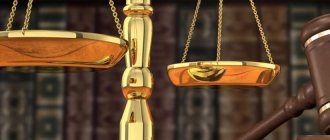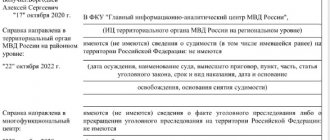It is necessary to distinguish between the concepts of additional and repeated examination. Within the framework of this article, details of the appointment and conduct of additional and repeated forensic examinations under the APC, Civil Procedure Code and Code of Criminal Procedure will be disclosed.
What other types of examinations are found in judicial practice, read in our article: “Classification and types of examinations.”
So let's get started.
Forensic examination in general, as well as additional or repeated, is intended to explain to the court or investigators circumstances that require special knowledge and skills. To order a forensic examination, an official (judge, investigator, inquiry officer) issues a resolution or ruling on the appointment of the examination.
If an examination of a combination of questions and objects has not been previously carried out within the framework of the case, it is called primary.
Next, the objects are transferred to an expert institution, and the examination is entrusted to specific performers - experts. Based on the results of the study, a document is drawn up - an expert’s conclusion (commission of experts). This document, together with the materials submitted for examination, is returned to the court or investigation.
Need expertise?
Order
What do you need to know about additional examination?
Of course, an expert is a person with special knowledge and skills. However, this does not guarantee that its conclusion will be clear to all participants in the process. The issue of unclear interpretations of the conclusion can be resolved in two ways: by questioning an expert or by ordering an additional examination. Moreover, in this situation, commercial expert institutions, as a rule, do not pay for the examination.
Let us give as an example the court’s question and the expert’s answer:
Question : What is the read date of the email?
Answer : The email is dated 04/01/2012.
In this situation, it is not disclosed what “dated” means - whether the dating of the letter is the date of its sending, delivery, or, in fact, reading.
Interrogation of an expert in such situations is most appropriate from the point of view of saving resources (time and material), and can be carried out by the body that appointed the examination or by the body entrusted with this. So, for example, an expert who gave an opinion on an arbitration case can simply be summoned to court. If the expert’s opinion is attached to the materials of a criminal case being investigated in a different region (compared to the region where the expert is located), then his interrogation, as a rule, is entrusted to employees of the investigative committee of the region where the expert is located.
So, in the above example, it is acceptable to receive an explanation from the expert that by the term “dated”, the expert meant exactly the date the letter was read.
The issues of appointing additional forensic examination are regulated by the articles of the relevant codes:
Code of Criminal Procedure of the Russian Federation Article 207 . Additional and repeated forensic examinations
- If the expert’s conclusion is insufficiently clear or complete, as well as if new questions arise regarding the previously investigated circumstances of the criminal case, an additional forensic examination may be ordered, the production of which is entrusted to the same or another expert.
Arbitration Procedure Code of the Russian Federation Article 87 . Additional and repeated examinations
- If the expert’s conclusion is insufficiently clear or complete, as well as if questions arise regarding the previously examined circumstances of the case, an additional examination may be assigned, the conduct of which is entrusted to the same or another expert.
Code of Civil Procedure of the Russian Federation Article 87 . Additional and repeated examinations
- In cases of insufficient clarity or incompleteness of the expert’s conclusion, the court may order an additional examination, entrusting it to the same or another expert.
The key point in all three codes is the assumption that additional examination may be assigned to the same expert .
Additional examination may be appointed both in the situation described above and for other reasons.
Additional forensic examination in civil proceedings (and not only) is appointed primarily due to the emergence of additional questions . Additional questions may arise both independently, during the examination, and as a result of the initial examination. In essence, the wording, additional questions do not imply special knowledge in an area other than the one in which the questions on the primary examination were posed. However, in some cases, questions may arise in related areas. Thus, based on the results of a video technical examination of a digital recording, a computer technical examination of the DVR may be required. But such an examination should be considered as a separate primary examination, and not as an addition to a previously conducted one.
As an example of the emergence of additional questions based on the results of the analysis of the expert’s opinion, the following situation can be cited:
Question : What information about the activities of Horns and Hooves LLC is available on the hard drive under study?
Answer : On the hard drive under study there is a 1C Enterprise 8 database, named “Hoof Accounting”
Additional question : Does the 1C Enterprise 8 database, available on disk, contain information about the payment of tax contributions for 2021?
Another reason for additional examination may be newly emerged research objects . Thus, the parties may “discover” another computer, potentially containing valuable information, documents related to the case, and so on. In this situation, the appearance of new questions is not necessary; simply adding objects is possible.
The example is quite simple:
Question : Do the 12 system units presented for research comply with the state conditions? contract No. 1 dated 01/01/2018?
Answer : The 12 system units submitted for research meet the conditions of the state. contract No. 1 dated 01/01/2018
Additional question : Do the 5 system units submitted for research comply with the state conditions? contract No. 1 dated 01/01/2018?
The last two situations obviously entail labor costs for the production of the study and, as a rule, are paid additionally for commercial institutions.
What do you need to know about re-examination?
Since there are two sides to almost any case, one of them will probably not like the expert's opinion. These can be formal quibbles with the design and procedure of the examination, as well as significant comments that cast doubt on the examination itself and its conclusions. In such cases, a re-examination is ordered. In dry legal language, this is formulated in the same articles of procedural codes as follows:
Code of Criminal Procedure of the Russian Federation Article 207 . Additional and repeated forensic examinations
- In cases where doubts arise about the validity of the expert’s conclusion or there are contradictions in the conclusions of the expert or experts on the same issues, a repeat examination may be ordered, the production of which is entrusted to another expert.
Arbitration Procedure Code of the Russian Federation Article 87 . Additional and repeated examinations
- If doubts arise about the validity of an expert’s conclusion or there are contradictions in the conclusions of an expert or a commission of experts on the same issues, a re-examination may be ordered, the conduct of which is entrusted to another expert or another commission of experts.
Code of Civil Procedure of the Russian Federation Article 87 . Additional and repeated examinations
- In connection with doubts that have arisen about the correctness or validity of a previously given conclusion, or the presence of contradictions in the conclusions of several experts, the court may order a repeat examination on the same issues, the conduct of which is entrusted to another expert or other experts.
- The court's ruling on ordering an additional or repeated examination must set out the reasons for the court's disagreement with the previously given conclusion of the expert or experts.
The key difference between a re-examination and an additional one is the fact that the expert has compromised his conclusion, his qualifications, and his objectivity. In this regard, a re-examination is always assigned to a different expert or a completely different commission of experts.
When conducting a re-examination, the same questions are indicated as in the primary examination, and the same objects are transferred for research.
Let us consider in more detail cases of compromise of an expert and his conclusion:
- Failure to sign a warning of liability for giving a knowingly false conclusion
- The rights and obligations of the expert are incorrectly formulated (for example, instead of the APC, the Code of Civil Procedure is indicated)
- The research objects do not correspond to those submitted for research qualitatively (damaged) or quantitatively (not fully provided), provided that the expert did not note this in the conclusion
- The conclusions do not correspond to the questions posed or contradict the research part
- There is a serious technical error (for example, the current is indicated in volts)
- The expert refers to his lack of technical or organizational ability to conduct an examination
- The expert violated the non-disclosure requirement
- The expert did not promptly notify the parties in the case about the examination. The most striking example is the inspection of a car after an accident.
- An expert or expert institution is dependent (affiliated) with one of the parties to the case
- The expert is a close relative of one of the participants in the process
- The expert used unacceptable methods (this fact requires proof, at least in the form of a review)
There are rarer cases when a re-examination is ordered after violations were discovered in the procedure for appointing the primary one. An example is the failure of the accused to familiarize himself with the decision to order an examination.
Commentary on Article 207 of the Code of Criminal Procedure of the Russian Federation
1. The factual grounds for conducting an additional examination entrusted to the same or another expert are insufficient clarity or completeness of the expert’s conclusion or the emergence of new questions in relation to the previously investigated circumstances of the criminal case.
2. Insufficient clarity should be understood as the impossibility of understanding the meaning and significance of the terminology used by the expert, the research methodology, the meaning and significance of the signs identified during the study of objects, the criteria for assessing the identified signs that cannot be eliminated by questioning the expert who carried out the examination at a court hearing.
An incomplete conclusion is one that does not contain answers to all the questions posed to the expert and does not take into account circumstances that are important for resolving the questions posed <1285>. ——————————— <1285> See: Resolution of the Plenum of the Supreme Court of the Russian Federation of December 21, 2010 N 28 “On forensic examination in criminal cases” // Bulletin of the Supreme Court of the Russian Federation. 2011. N 2.
3. The decision to order an additional forensic examination must indicate specifically what the incompleteness and lack of clarity of the previous expert opinions expressed, and whether there are grounds to doubt their correctness <1286>. ——————————— <1286> See: Determination of the Judicial Collegium for Criminal Cases of the Supreme Court of the Russian Federation dated October 24, 1995 // Bulletin of the Supreme Court of the Russian Federation. 1997. N 7.
4. An additional forensic examination is appointed only after the expert has given an opinion, if the lack of clarity or completeness of the conclusion cannot be eliminated by questioning the expert.
5. Depending on the nature of the issues and the volume of materials being examined, an additional examination may be carried out at a court hearing. Participants in the trial, at their request, with the consent of the court, have the right to be present during the expert examination carried out outside the courtroom, except in cases where the court, at the request of the expert, considers that this presence will interfere with the examination. The fact that a participant in the trial was present during a forensic examination outside the courtroom should be reflected in the expert’s report.
6. In cases where there is a need to resolve new issues in relation to previously examined objects, an examination is appointed in accordance with Article 195 of the Code of Criminal Procedure and its production is entrusted, as a rule, to the same expert, if the upcoming research does not go beyond the scope of his special knowledge <1287 >. ——————————— <1287> See: Resolution of the Plenum of the Supreme Court of the Russian Federation of December 21, 2010 N 28 “On forensic examination in criminal cases” // Bulletin of the Supreme Court of the Russian Federation. 2011. N 2.
7. When conducting an additional forensic examination, the expert resolves issues that have not previously been examined.
8. If an expert carries out a repeated forensic examination, he resolves issues that have previously been examined.
9. If doubts arise about the validity of the expert’s conclusion or if there are contradictions in the experts’ conclusions on the same issues, a repeat examination may be ordered, the production of which is entrusted to another expert.
10. An expert’s conclusion in which the conclusions are not sufficiently substantiated, the necessary methods and techniques of expert research are not applied or incorrectly applied, should be considered unfounded.
11. The court also has the right to order a re-examination if it establishes facts of violation of the procedural rights of participants in the trial during the appointment and conduct of a forensic examination, which influenced or could influence the content of the experts’ conclusions <1288>. ——————————— <1288> See: Ibid.
12. See also: commentary to Art. Art. 195 - 199, 202 - 205, 389.16 Code of Criminal Procedure of Russia.





